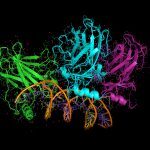Lien vers Pubmed [PMID] – 32019800
Lien DOI – e03171-1910.1128/mBio.03171-19
mBio 2020 02; 11(1):
Mitochondrial function adapts to cellular demands and is affected by the ability of the organelle to undergo fusion and fission in response to physiological and nonphysiological cues. We previously showed that infection with the human bacterial pathogen Listeria monocytogenes elicits transient mitochondrial fission and a drop in mitochondrion-dependent energy production through a mechanism requiring the bacterial pore-forming toxin listeriolysin O (LLO). Here, we performed quantitative mitochondrial proteomics to search for host factors involved in L. monocytogenes-induced mitochondrial fission. We found that Mic10, a critical component of the mitochondrial contact site and cristae organizing system (MICOS) complex, is significantly enriched in mitochondria isolated from cells infected with wild-type but not with LLO-deficient L. monocytogenes Increased mitochondrial Mic10 levels did not correlate with upregulated transcription, suggesting a posttranscriptional mechanism. We then showed that Mic10 is necessary for L. monocytogenes-induced mitochondrial network fragmentation and that it contributes to L. monocytogenes cellular infection independently of MICOS proteins Mic13, Mic26, and Mic27. In conclusion, investigation of L. monocytogenes infection allowed us to uncover a role for Mic10 in mitochondrial fission.IMPORTANCE Pathogenic bacteria can target host cell organelles to take control of key cellular processes and promote their intracellular survival, growth, and persistence. Mitochondria are essential, highly dynamic organelles with pivotal roles in a wide variety of cell functions. Mitochondrial dynamics and function are intimately linked. Our previous research showed that Listeria monocytogenes infection impairs mitochondrial function and triggers fission of the mitochondrial network at an early infection stage, in a process that is independent of the presence of the main mitochondrial fission protein Drp1. Here, we analyzed how mitochondrial proteins change in response to L. monocytogenes infection and found that infection raises the levels of Mic10, a mitochondrial inner membrane protein involved in formation of cristae. We show that Mic10 is important for L. monocytogenes-dependent mitochondrial fission and infection of host cells. Our findings thus offer new insight into the mechanisms used by L. monocytogenes to hijack mitochondria to optimize host infection.




